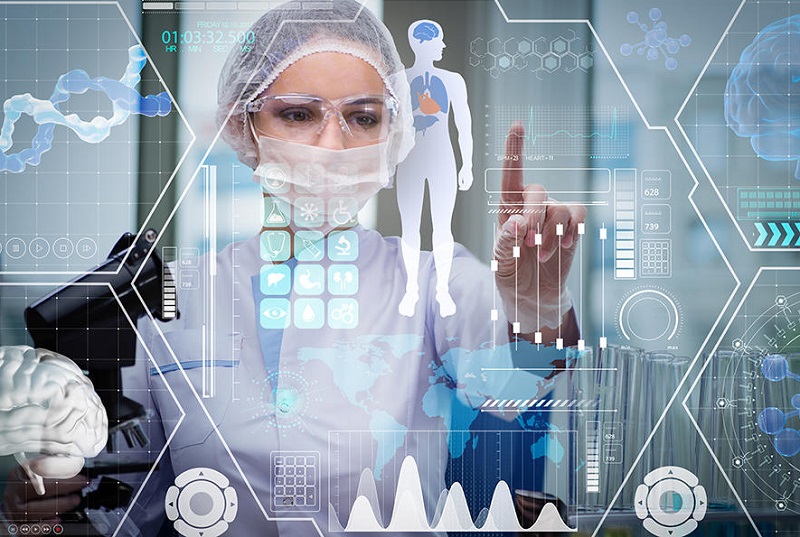Professor of Medical Physics-Nanomedicine, Stathis Efstathopoulos, explains how it will contribute to increasing life expectancy
The scientific community seems to be betting on artificial intelligence to increase life expectancy, which, according to experts, is expected to soon reach a century.
“I am fascinated by this huge field that is opening up in front of us, of increasing the accuracy and efficiency with which we will make diagnoses and give treatments, which will ultimately contribute to increasing life expectancy,” says the professor of Medical Physics – Nanomedicine , vice-rector of Research and Innovation of EKPA, Stathis Efstathopoulos. “Until recently, we considered it unthinkable for someone to reach 100 years old. But I think that now we can say it with certainty. If not our generation, surely the next generation will exceed 100”, the professor points out in an interview with the Fm Agency about the applications of artificial intelligence in medicine, outlining a future which, as everything shows, is already here.
Artificial intelligence program predicts myocardial infarction
Historically, the first application of artificial intelligence in medicine is mammography, but also medical imaging in general, i.e. CT and MRI, says the vice-chancellor and president of the Hellenic Society for Nanotechnology in Health Sciences (ELENEPY). To add further, that applications of artificial intelligence exist in dermatology and ophthalmology, where one can detect early stages of diseases such as retinopathy due to diabetes, macular degeneration or skin cancer.
“Another field is cardiology. For example, my group in collaboration with other groups 6 months ago completed a large research project, where we applied artificial intelligence algorithms to assess someone’s risk of having a myocardial infarction. Such AI models have been developed around the world.” The research program has been completed, I hope we can turn it into a product, emphasizes Mr. Efstathopoulos.
Artificial intelligence tools speed up new drug discovery
Regarding the development of new drugs, according to him, artificial intelligence tools can speed up their discovery process, because they help experts by predicting the structure and function of new molecules that can contribute to effective treatments. “There are several such research results from groups from all over the world that help us in these and of course in personalized medicine, “to tailor a suit to everyone’s measurements”, i.e. to give a medication that suits each individual’s case” . Regarding genetics, the professor comments that it is a privileged field for artificial intelligence, “because these tools, through the analysis of a large amount of genetic information data, help us to predict, but also to prevent diseases”
Experimental robots are being tested in the role of surgeon – What dangers lie ahead for humanity
Artificial intelligence is also contributing to robotic surgery. As Mr. Efstathopoulos mentions, in an artificial intelligence system experts integrate algorithms, which help the surgeon to increase the precision, speed and safety of the surgical operation. “And possibly, in the near future, the robots themselves will operate, something that is already being tested in an experimental stage.” What dangers does this pose to humanity and how should the limits be defined? Can a machine completely replace the human hand and what issues might arise from doing so, the vice-chancellor rightly asks. You raise a very big topic that includes many issues and fields, replies Mr. Efstathopoulos and explains: “First, the field of bioethics emerges. Also, legal issues emerge, but also issues of acceptance of artificial intelligence applications by the patients themselves, and issues of acceptance of these systems by doctors.”
Patients accept the use of artificial intelligence tools, but with human intervention
Starting with the acceptance of patients, Mr. Efstathopoulos says there are many studies, including his own team at Attikon, which show that patients are accepting of the scientific community using artificial intelligence tools. “However, they do not accept to get their diagnosis from an artificial intelligence system. They want the doctor to be in charge of the diagnosis.” Would you accept to receive your diagnosis from an artificial intelligence system, the vice-chancellor of Research and Innovation of EKPA is then asked.
“Very good question, but I cannot give a definite answer. Generally speaking, I would say in this phase we are in, no I would not accept. And the reason is that AI systems right now are, to a large extent, dependent on the training they receive. So, I need to know what training such a system has received, in order to know whether to trust it. And indeed for the same reason, I have no answer to give you, as to whether I would accept it to help me. Because if an AI system has been trained with data that is “garbage” it will answer me with “garbage”. Therefore, with the same logic, there is also a question mark regarding the acceptance of these systems by doctors. If we don’t check these systems and test them, we don’t accept them a priori.”
According to the Bioethics Committee artificial intelligence systems cannot operate autonomously
The Bioethics Committee highlights all these issues and considers that at the moment artificial intelligence systems cannot work autonomously, but only as auxiliary tools and the responsibility rests with doctors, says Mr. Efstathopoulos. But what is the perspective in ten years, is the next question posed to the professor. “For the decade I do not foresee that this can change. As far as I can tell, the responsibility will rest with the doctors. And here come the issues of legal regulations. Will humanity, our community, our lawyers ever accept that there are regulations where artificial intelligence systems can operate autonomously? This is a matter of settings. And come back to me to use an example from an area of interest of mine outside of health, which is chess. In 1997 when the IBM machine beat the world champion Gasparov (considered by many to be the strongest chess player of all time) it was proved that AI tools in chess play better than humans. This has since been maximized and there is no way a human can beat an AI program at chess. So, chess players don’t let AI programs play in tournaments.”




